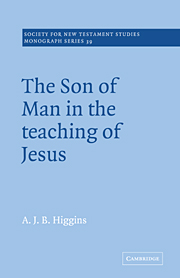II - The Son of man in the synoptic gospels in recent study
Published online by Cambridge University Press: 30 October 2009
Summary
This survey of Son of man-Forschung makes no claim to completeness, which in any case is probably unattainable, but seeks to review the main trends and developments since my earlier book Jesus and the Son of Man (1964).
A number of scholars still find authentic words of Jesus in all three groups of sayings: those referring to his earthly activity, those foretelling his passion and resurrection, and those looking to the parousia and glory of the Son of man. Among them are Goppelt, Moule, Maddox, Marshall, Barrett, and Bruce.
Goppelt adds to the authentic sayings the following: Mark 2.10, 28; the Q present sayings Matt. 8.20, par.; 11.19, par.; 12.32, par.; the future saying Luke 12.8, regarded as more original than parr. Matt. 10.32 and Mark 8.38; and a passion prediction behind Mark 8.31, traceable to the oldest Palestinian tradition and possibly to Jesus in the form, ‘The Son of man must suffer many things and be rejected (and after three days be raised up)’; this last part is implicit, because in the idea of the suffering righteous man rejection leads to exaltation.
Marshall does not take into account all the texts. The establishment of the fact (sic) that Jesus referred to himself as Son of man in his earthly ministry makes it impossible to believe that in the future sayings he could have referred to someone else, for he could not have spoken about two Sons of men! Jesus, therefore, refers to himself in Luke 12.8f.; 12.40, par. Matt. 24.44; Luke 18.8b; Mark 14.62.
- Type
- Chapter
- Information
- The Son of Man in the Teaching of Jesus , pp. 29 - 54Publisher: Cambridge University PressPrint publication year: 1980



